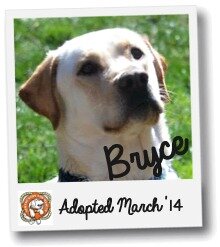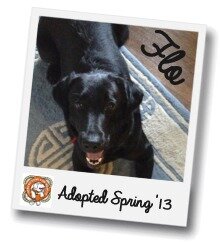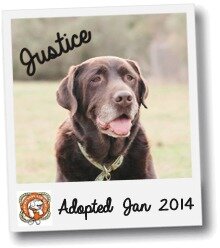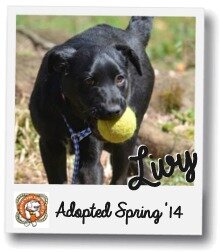Fostering A Lowcountry Lab Rescue Dog
Thinking about becoming a foster? You're at the right place! Everything you need to know is on this page. Read on, then if you're ready, complete the online Foster Application at the bottom of this page.
Foster Program Highlights
Foster homes are crucial to our efforts to save labs that would otherwise be put to sleep. In 2014 we saved over 135 labs thanks in large part to the generosity of our foster families. If you are considering joining the ranks of our wonderful Foster Homes, or are a new Foster Home, this outline will highlight the things you need to know about the program.
Administrative Stuff
Foster Application - All Foster Homes must have completed the online Foster Application (bottom of this page) and be officially approved by the Foster Director.
Foster Agreement - Before receiving your first foster dog, the Foster Home Agreement must be completed and signed. This is typically done at the time the first foster dog is delivered.
Foster Coordinator - Foster Homes will be assigned a Foster Coordinator who will be your point of contact for any questions/concerns that are not answered by these Foster Home Information materials. In the event you misplace these documents, this information is located on our website at www.lowcountrylabrescue.org on this page.
What You Can Expect from Lowcountry Lab Rescue (LLR)
Veterinary Screening - Prior to being assigned a Foster Home, each dog will be screened by a Veterinarian. All necessary vaccinations will have been completed and any known medical problems will be addressed. If there are any ongoing medical issues, these will be discussed with you prior to the dog being assigned to you. We want the foster match to be a good one and won’t surprise you with anything we can reasonably assess up front.
Supplies During Foster Period - Lowcountry Lab Rescue (LLR) will provide food, crate, collar, leash, heartworm preventative and other necessary medicines.
Donation of Supplies - If you are able to donate the food and other supplies used during the foster period, this really helps our overall cause. However, it is most important to us that you be a foster home and if covering other costs is not feasible, please don’t let this stop you. We will gladly cover them!
Your Responsibilities as a Foster Home
Indoor Shelter - We are sticklers for ensuring that our foster dogs are provided safe, indoor shelter. Crates may be used when you leave the house and at night. This is a great idea in the beginning of your foster period, until you get to know the dog and the dog has had a chance to get used to your home.
Housetraining - Some foster dogs are NOT housetrained, and may not be used to living indoors. We ask our foster homes to make a good faith effort to assist with housetraining.
Basic Care - Obviously we expect foster homes to feed, water and otherwise care for the dog in their care. Treat them as you would one of your own!
Health Monitoring - You should monitor the dog’s health and contact your Foster Coordinator if any serious concerns arise. Remember that dogs often have upset stomachs and diarrhea from the stress of being in a shelter and having to get used to new surroundings. This is normal. Bloody diarrhea is not and you should report this to the Foster Coordinator. If you think the dog needs veterinary care, please discuss with the Foster Coordinator in advance, except in cases of emergency. LLR will take care of 100% of the cost of veterinary care provided by an Approved Veterinary.
Heartworm Preventative - You are responsible for giving the dog heartworm preventative and flea/tick treatment monthly, and keeping records of the administration of this medication. We will supply you with these medications.
Weekly Updates - You are responsible for sending weekly status updates via email to the Foster Director. This information keeps us informed of how the dog is doing and helps us to better match the dog with a permanent home. Notes on the dog’s personality, ability to learn, results of training efforts, etc., are all useful.
Foster Period – You agree to provide your Foster Home until LLR can find a permanent home for the dog. This can take up to 3 months on average; sometimes it happens more quickly. We want the dog in a stable, unchanging environment until adoption takes place.
Vacations - If you have a vacation scheduled during the foster period, please contact your Foster Coordinator in advance to discuss options for care of the foster dog while you are gone.
Things to Keep in Mind in the Early Days of Fostering
Settling In - Remember that your foster dog has likely spent time in a shelter, which is not a fun experience. They may also have been abandoned prior to being in the shelter. So the dog has likely been through some anxiety-filled or even traumatic times before coming to your home. It will take a while before the dog begins to feel safe and secure. You should see this progression a little every day.
Crating a Dog – We provide you with a crate, and request that you crate the dog at night and when you leave your home. We also advise that you let the dog spend extra time in the crate the first couple of days, even when you are home. While you will want to interact with the dog and make them feel like part of the family, they will benefit from some time to decompress and de-stress after being in a shelter.
Adjustment to other Pets, Children - If you have other dogs, pets or children, they too have an adjustment period to go through. Be patient and know that most likely everyone will get used to each other in a few days.
Aggression by Dog - If the dog shows any signs of aggression toward humans or animals (grows, snarl, snap or bite), please contact your Foster Coordinator immediately to discuss.
Training Efforts - Like any dog, your foster dog needs structure and training. We don’t expect you to conduct full obedience training, but would ask that you work on basics like using NO command to keep dog from getting into things he shouldn’t, jumping on people, etc. Also, basic commands like Sit, Come are great commands to work on with your foster dog. It helps their sense of security and makes them an even better dog for their future permanent home.
Lost Dog - It’s not uncommon for foster dogs to run away or get loose. Try to avoid this by securing them as needed, but if it happens, please contact your Foster Coordinator immediately.
Adoption – the Ultimate Goal (What You Need to Know as Foster Home)
Adoption-Ready - A keypart of your role as Foster Home is to get the dog “adoption-ready”…this comes from helping them feel secure, doing a little bit of training, and sharing their progress with LLR so that we can find them a best-fit permanent home.
Coordinating Visits with Adoption Prospects - Your Foster Coordinator will contact you when LLR has someone interested in adopting the dog. They will work with you to coordinate a visit by the adoption applicant. Typically, the Foster Coordinator will be present for the meeting as well. We need you to make yourself available for this, but also don’t expect you to drop everything when it doesn’t fit your schedule. Please be as flexible as possible and remember the goal is to get the dog adopted so we can save another one!
When Interested Parties Contact You Directly - If a friend or acquaintance approaches you interested in the dog, please direct them to fill out an Adoption Application on our website (www.lowcountrylabrescue.org). We use this application as the starting point and also as a way to determine the order of interest in a particular dog. For example, if someone says they are interested in a dog but delay in filling out the application, someone else might submit an application first and have “first option” to be considered for adoption of that dog. The system is a first come, first served system based solely on the submitted application. You can serve as a reference for friends or relatives interested in the dog, but remember that LLR makes adoption decisions based on this process alone.
Lowcountry Lab Rescue Foster Application




